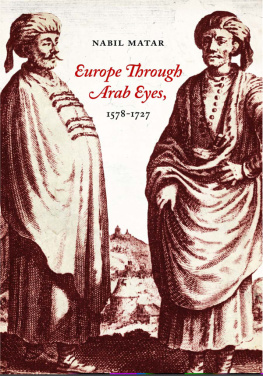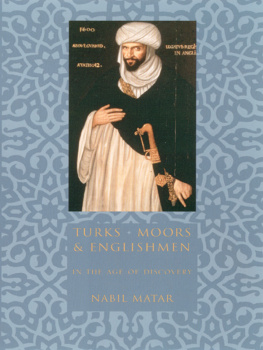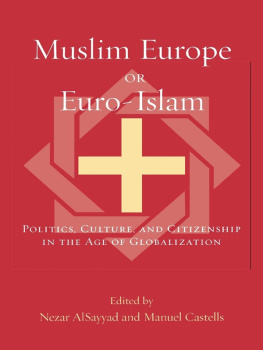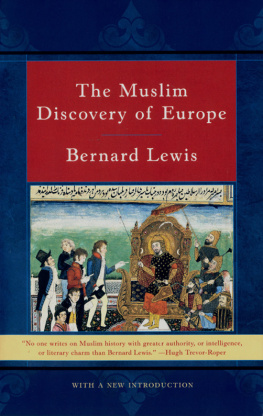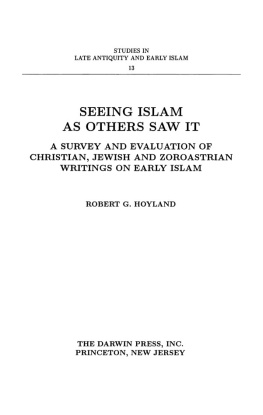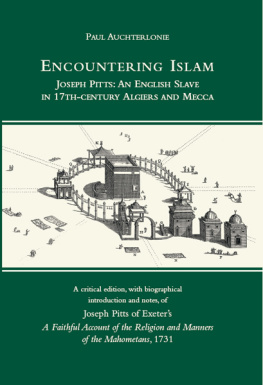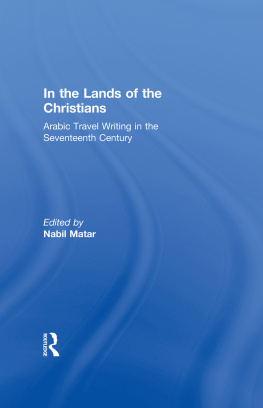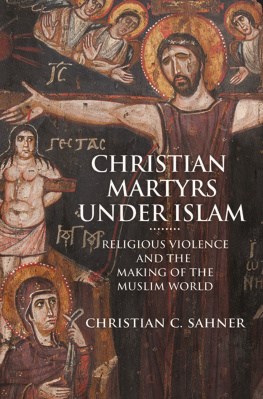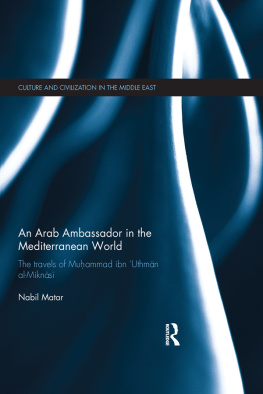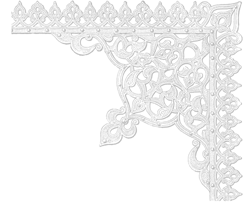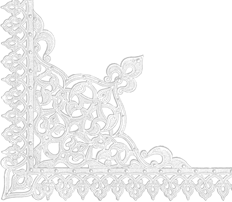EUROPE THROUGH ARAB EYES, 15781727
Europe Through Arab Eyes, 15781727
Nabil Matar
COLUMBIA UNIVERSITY PRESS NEW YORK

COLUMBIA UNIVERSITY PRESS
PUBLISHERS SINCE 1893
NEW YORK CHICHESTER, WEST SUSSEX
cup.columbia.edu
Copyright 2009 Columbia University Press
All rights reserved
E-ISBN 978-0-231-51208-4
Library of Congress Cata loging-in-Publication Data
Matar, N. I. (Nabil I.), 1949-
Europe through Arab eyes, 1578-1727 / Nabil Matar.
p. cm.
Includes bibliographical references and index.
ISBN 978-0-231-14194-9 (hard cover : alk. paper)ISBN 978-0-231-51208-4 (pbk. : alk. paper)
1. Arab countriesRelationsEurope. 2. EuropeRelationsArab countries. 3. EuropeForeign public opinion, Arab. 4. ArabsAttitudes. 5. EuropeHistory17th centurySources. 6. Arab countriesHistory1517-1918Sources. I. Title.
DS63.2.E8M38 2008
303.4824017492709032dc22
2008026478
A Columbia University Press E-book.
CUP would be pleased to hear about your reading experience with this e-book at .
For Inaam
CONTENTS
3. ca. 15891591: A Journey from Morocco to Istanbul and Back, in Abu Hasan Ali ibn Muhammad ibn Ali Muhammad al-Tamjruti, Al-Nafhah al-Miskiyah f al-Safarah al-Turkiyah,
ed. Abd al-Latf al-Shadhili, 2829, 4142, 65, 7476, 8486, 9094, 128132, 140141.
T his book was presented in a shorter version as the H. A. R. Hamilton Gibb Islamic Studies Lecture Series at Harvard University in April 2003. I am grateful to Cemal Kafadar for inviting me to give those lectures, and for the stimulating discussions I had with him, with Gurlu Necipoglu and Salma Khadra al-Jayyusi, and with many graduate students. Research for this book was partly supported by a grant from the American Institute for Maghrib Studies and from the British Academy. To the president and officers of AIMS, especially Becky Schulthies, I am deeply thankful, as I am, too, to Paul Hammond of Leeds University, who supported my application to the Academy.
Many people have been helpful during my work on this book. I benefited from enriching discussions with Anouar Majid of the University of New England and with the late Nicola Ziadeh of the American University of Beirut, both of whom were generous with their knowledge of the Maghrib. I also wish to thank Mohammad Shaheen of Jordan University, a very dear friend, for hosting me during my research trips to Jordan and providing me with observations, comments, and introductions to some of the finest scholars in the region. Many, many thanks are due to Mohammad Asfour, formerly of Sharjah University, who, during very trying times, read parts of this book and gave me valuable suggestions. Since we shared an office at the University of Jordan more than three decades ago, he has been an ongoing source of knowledge and friendship to me.
I also wish to thank Kenneth Parker of London University for the example he has set for me of strength and dedication. For reading drafts of chapters, or for inviting me to deliver lectures at their institutions and sharing with me their, as well as their students, enthusiasm and curiosity, I wish to thank the following professors: Lamia Shehadeh, formerly of the American University of Beirut; Hayat Bualwan of the Lebanese American University; James Monroe of the University of California at Berkeley; Barbara Fuchs of the University of Pennsylvania; Cornell Fleischer of the University of Chicago; Ross Brann of Cornell University; Claire Jowitt of Nottingham Trent University; Mohamed-Salah Omri, formerly of the Institute of Arab and Islamic Studies at Exeter University, England; Bindu Malieckal of St. Anselm College; John Tolan of the Universit de Nantes; Donna Landry of Kent University; and Gerald MacLean of Exeter University. I wish to thank Donna and Gerald for wonderful and stimulating times in Exeter, London, and Canterbury.
I am grateful to the staffs of many libraries who made this project possible: the Houghton Library, Harvard University; the Public Record Office/the National Archives, Kew; the British Library, London; the Devon Public Record Office, Exeter; the Bibliothque Nationale, Paris; the Bibliothque Nationale, Rabat; the Bibliothque Royale, Rabat; the Qarawiyyn Library, Fez; the Bibliothque Nationale, Tetouan; the Bibliothque Nationale, Tunis; and the Bibliotheca Alexandrina, Alexandria. Closer to what used to be home, I wish to thank Victoria Smith of the Interlibrary Loan Service at the Florida Institute of Technology for her unfailing help during the two decades that I spent there.
This work would not have been possible or enjoyable without the friends who helped me during my research trips to Spain, Morocco, Tunisia, Egypt, and Jordan. It was in Morocco, however, that I made new friends to whom I am deeply indebted: Afaf Hamzaoui, who transcribed some texts and, with her father, Omar Hamzaoui, furnished me with information about history and hotels, mosques and zawiyas. I also want to thank the curator of the Rabat National Library,Abdelkarim Hfidi, who ensured my access to both the original manuscripts and the microfilms and was always most gracious with his advice. Hasna Labbadi of the University of Muhammad V and her husband, Mansur, were hospitable and welcoming, as were Khalid Bekkaoui and his family in Fez, who took me into their home and extended warmth and assistance. In Tetouan, I again found both hospitality and perspicacity in Jaefar Soulami and his wife.
To H. E. Mr. Mohammed Belmahi, the Moroccan ambassador to the United Kingdom, I express my deep gratitude. With generosity and graciousness, he hosted the launching of my final book in the trilogy on Britain and North Africa in his London residence, while granting me constant access to resources in his private collection.
In England I have many friends and mentors, of whom I wish to thank Dominic Baker-Smith, my supervisor at Cambridge, whose influence has always remained paramount; Patrick Spottiswoode at the International Shakespeare Globe Centre for his wonderful insights into Elizabethan thought; and Dina Matar at SOAS, who with her husband, John Taysom, have been most hospitable.
I wish to thank the secretaries and staff in the Department of Humanities and Communication at Florida Institute of Technology: Kristy Kiser, Delilah Caballero, and Laura Metz, who always worked meticulously and generously. Their efficiency, charm, and gentility were a blessing to me as well as to all of the faculty. During the writing of this book, I served under two deans at Florida Tech, and I wish to thank each of them, Dean Gordon Nelson and Dean Mary Beth Kenkel, for allowing me the latitude to work on what sometimes seemed to them an interminable project. I also wish my successor, Robert Taylor, all the very best as he assumes the chairmanship of the Department of Humanities and Communication. He has always been a source of insight and vast knowledge, especially in regard to American history and culture. Among the faculty in the department, I wish to thank in particular Alan Rosiene, whose knowledge of medieval and early modern European thought corrected many a misconception; to him, too, goes my gratitude for his help with the Latin texts and the many other questions I posed to him during the years. I also wish to thank Jane Tolbert, who introduced me to Thomas dArcos and gave me all the material that she had laboriously collected. I also want to thank Zohra Fazal, who helped me with Quranic citations, Angela Tenga who carefully read the final typescript, and Aurelie Moulin, who was ever punctual and meticulous. Despite her onerous research in oceanography, Aurelie helped me with the French texts. Thanks are also due to Hasan Baktir, an e-mail correspondent in Turkey, for translating the Turkish terms and phrases that appeared in the Arabic sources. To Grace Wiley, who translated a Portuguese text for me, I am thankful.

